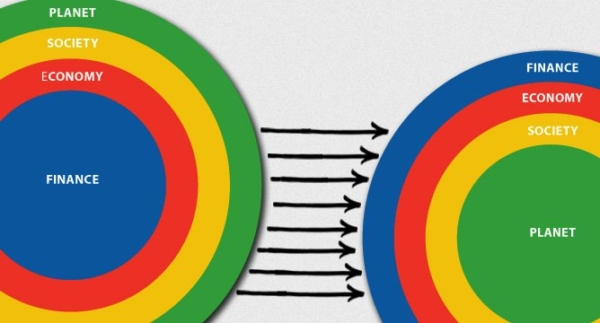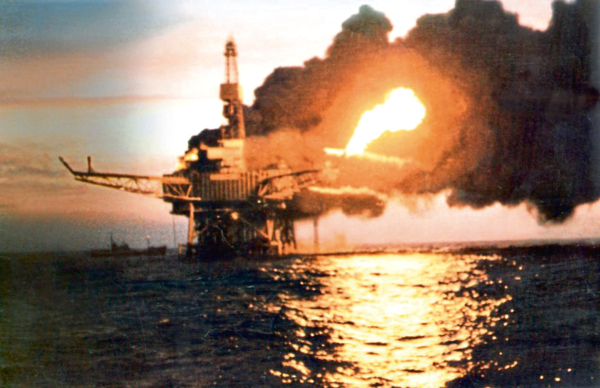The Fossil Fuel Age is Over


Aggregate efficiency describes the way in which every resource is optimally allocated to serve each individual in the best way while minimizing waste and inefficiency. Our evolution as a society has been about securing greater efficiency.
Human history has experienced several major tipping points which each share a paradigm altering platform shift in our ability to manage, power and move economic activity. New forms of communication, energy and transportation have converged to create industrial revolutions which become the infrastructure of our economy.
During the first industrial revolution there were two forms of advancements in communication; the steam powered printing press and the telegraph infrastructure. This increased our capacity and speed in which we could communicate across our economy. This then converged with coal as a new form of energy. The steam engine provided the transport and logistics for locomotives and the rail infrastructure to improve our ability to move coal across the nation.


Our economy has continued to be centred on fossil fuels as the main driver behind our energy, communication and transportation. This had reached its tipping point in June 2008, two months prior to the financial crash, when the price of Brent crude oil hit it’s record high of $145.
What makes this so significant is the way in which we rely on energy for our entire economy to operate. We can build houses as the materials we use are made from fossil fuels. We can produce the pharmaceuticals we need because we rely on fossil fuels to produce them. Our agriculture industry is dependent on machinery which requires fossil fuels to operate.
When the price of oil reaches this record high, the costs of all other resources which are dependent on fossil fuels begin to see their prices inflate. Economic activity then begins to slow as purchasing power is decreased.
Fossil fuels reached their lowest price in decades in the last few years, brought on by internal fighting. OPEC flooded the market with oil to keep their market share as new oil competitors entered the arena with shale gas increasing profitability and Iranian sanctions being reduced.
A significant aspect to this is the market models we have in place. Currently, energy as a commodity forces energy to be produced, bought by energy companies, then sold for investor profits. This accumulates the wealth of fossil fuels to a small number of people. This has also made new forms of technology to be unprofitable. Renewable energy faces unnecessary costs where it is sold wholesale to energy companies, then sold at a retail price to consumers.


The internet has generally not been a significant technology in terms of global impact. That is until we have begun to converge this form of communication with digitalised renewable energy. We then converge this technology with transportation to develop increasingly automated vehicles which are run on the basis of renewable energies. Once we build these technologies into the state infrastructure and produce models which allows natural grids, we reach a new industrial revolution.
Scotland has been compared to Saudi Arabia when you consider the wealth of renewable resources. Some have suggested that Scotland could be home to the data capital of Europe. With effective investment, Scotland could become a world leader in transport infrastructure for renewable and automated vehicles. Yet, there continues to be popular belief that Scotland can continue to operate with a second industrial infrastructure.
It is a difficult task to admit that our fossil fuel resource has been well and truly squandered. Dreams of producing a Norwegian style wealth fund are beyond our capabilities. If Scotland continues down this path, it will remain within the boundaries of the second industrial revolution as other nations embrace the third industrial revolution and improve their aggregate efficiency.
If Scotland is to be the forward thinking nation we all know it can be, it must accept that the fossil fuel age will be left behind as was the bronze age. We are in the midst of a paradigm shift, let’s embrace it by changing the way our system works.
1] https://www.macrotrends.net/1369/crude-oil-price-history-chart
2] https://www.google.com/amp/s/www.scotsman.com/business/companies/tech/can-edinburgh-become-data-capital-of-europe-1-4804896/amp

I agree that we need to move away from fossil fuels and increase our use of renewables dramatically. However, oil is not going to disappear from the economies of the planet any time soon. Even renewables need oil to produce the various bits’n’bobs that go into the manufacture of the turbines etc. You use the comparison of “technological ages” to illustrate your argument. However, when the Stone Age ended, and we moved into the Copper Age and beyond, people still used stone technology for millennia afterwards. It didn’t disappear overnight. The same as bronze didn’t vanish as soon as someone smelted the first bit of iron.
My point is, Scotland shouldn’t turn its back on oil just because “its had it’s time” and something else has come along. It is still a valuable and necessary global resource that can do a lot for a newly independent Scotland’s economy. Yes, begin the process of reducing our reliance on it. But lets not shut it down unilaterally (or similar) just so we can shine our ecological halo’s.
PS Just caught an episode of a Norwegian drama on Netflix that dramatizes a possible unlooked for consequence of unilaterally shutting down Norway’s oil production called “Occupied”. It looks interesting …. and depressing.
Oil / Gas is here and it’s a resource like water there will always be a demand for it’s supply. And Scotland can still benefit let’s not deny or ignaore this.
I agree that with all your sentiments however and enjoyed the read.
I am increasingly becoming annoyed by constant ref and comparison made with Norway’s Sovereign Wealth Fund in terms of Scotland’s lost opportunity.
“Dreams of producing a Norwegian style wealth fund are beyond our capabilities”.
It’s time that commentators highlighted that the United Kingdom of Great Britain and Ireland squandered their opportunity. It’s about time the narrative changed to focus on the potential cumulative value of this potential nest egg for the UK and what that value was actually wasted on.
We all know that had Scotland the chance we would have managed it in a similar fashion to the Norwegians!
The UK ain’t got no Sov Wealth Fund – we’ve got the very opposite.
Lets begin to reframe this conversation in our favour.
David you don’t seem to make any reference at all to the issue of climate change and fossil fuels as the main driver of it? Can you explain how this is possible?
Mr Berry ought not to ignore burgeoning developments in nuclear power reactors in his ‘integrated state [energy] infrastructure’. 15 years from now a uniquely simple and therefore cost-effective Small Modular Reactor [SMR], rated at 300 MW, will be available at one quarter of the cost of Hinkley and competitive with gas. It will power conventional steam turbines and can generate all of the electricity the UK uses at 1/8th of the cost of a wind/solar/CCGT infrastructure.
The state [electrical energy] infrastructure – the grid – would operate in the same way as it has done for a hundred years with virtually 100% effectiveness. But instead of fossil-fuelled spinning reserve and a bit of conventional and pumped hydro, all of the fossil fuel power stations would be replaced by SMR power stations. Electricity generation would be totally decarbonised with the existing grid capacity.
6 months ago, James Conca wrote: “…the United States Nuclear Regulatory Commission just agreed that any emergencies that could possibly occur at a small modular nuclear power plant probably won’t even get past the fence……….No need to come up with huge evacuation plans for nearby cities or anyone living near the plant, like we did for older plants. You can just stand there at the fence and watch what’s going on…”. SMRs can be located close to population centres!
This 300 MW SMR is rated at 900 MW thermal and the power stations being used for electricity generation also have huge potential to decarbonise heating and hot water for buildings, which accounts for 40% of the UK’s energy usage, Adding more SMR power stations would accommodate the additional electricity supply for the change over to EVs in the smaller vehicle sizes. Dedicated SMR plants for process heat plus electricity can produce syn-fuels necessary for decarbonising air travel and transport, shipping and heavy goods.
This blog post gives the starting cost-comparison figures for decarbonising electricity generation, but extrapolation for decarbonising heat and transport is not difficult to imagine: https://bwrx-300-nuclear-uk.blogspot.com/2019/03/butwhat-about-100-low-carbon.html
It’s not close to being over. This is one of the most delusional articles I’ve ever read. Research what happened in Germany.
What happened in Germany? You might need to narrow that down a bit…